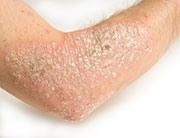Guselkumab appears more effective than standard treatment, researchers report
THURSDAY, July 9, 2015 (HealthDay News) — Preliminary trial results suggest that an experimental drug may be more efficacious for psoriasis than the current standard treatment. The results were published in the July 9 issue of the New England Journal of Medicine.
For the year-long trial, researchers randomly assigned 293 adults with moderate to severe psoriasis — at least 10 percent of the body affected — to different doses of guselkumab, adalimumab, or a placebo. The authors found that after 16 weeks of treatment, patients on guselkumab showed significantly more improvement than those on adalimumab or a placebo.
The improvement in psoriasis among those getting 100 mg of guselkumab remained more significant at 40 weeks (77 percent, versus 49 percent with adalimumab), the researchers found. However, over 16 weeks, infections — including appendicitis and pneumonia — were seen in 20 percent of patients taking guselkumab, compared with 12 percent of those taking adalimumab and 14 percent of those taking the placebo.
The drug works by blocking the protein interleukin-23 (IL-23). The phase 2 trial study shows that blocking IL-23 resulted in significant skin clearance, lead researcher Kristian Reich, M.D., a partner at Dermatologikum in Hamburg, Germany, told HealthDay. “These findings provide important insights into the role of IL-23 in psoriasis and the potential therapeutic benefit of guselkumab. My patients specifically like the long injection intervals,” Reich said. After an initial injection, another one is given at four weeks and again every eight weeks or 12 weeks.
The trial was funded by the drug’s maker, Janssen Biotech, a subsidiary of Johnson & Johnson.
Full Text (subscription or payment may be required)
Copyright © 2015 HealthDay. All rights reserved.








